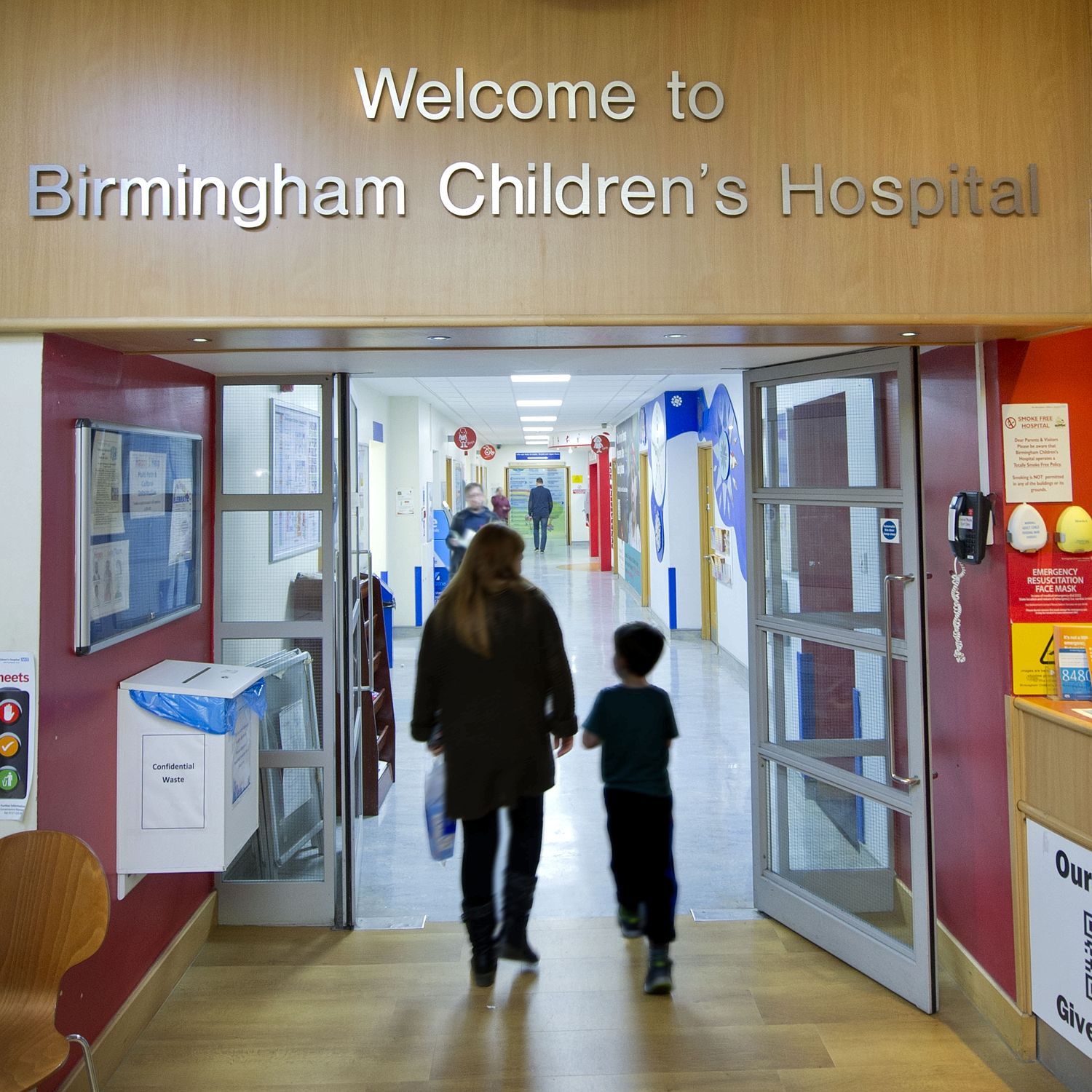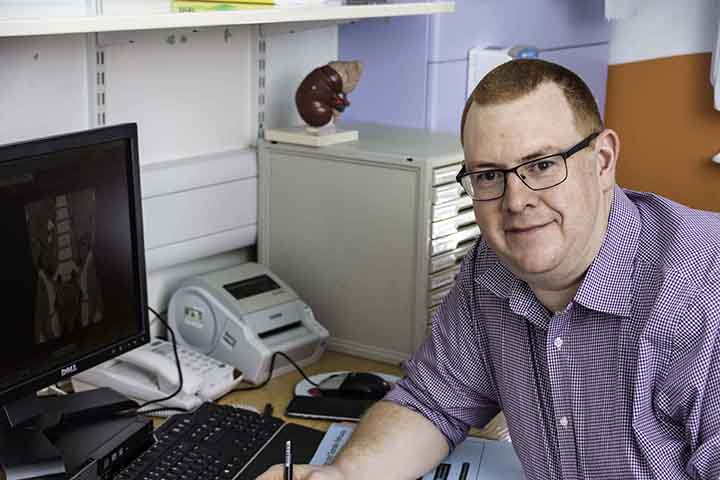
Organising an Appointment
I see NHS referrals from all over the West Midlands and further afield.
To organise an appointment you will need a referral from your GP or another doctor.
Elective referrals should be sent to:
Mr Andrew Robb
Consultant Paediatric Urologist
Birmingham Children's Hospital
Steelhouse Lane
Birmingham
B4 6NH
Urgent referrals can be made by contact my secretary, Vicki Hill (0121 333 8082).
For emergency referrals:
- In hours the on-call urology registrar can be contacted via BCH switchboard
- Out-of-hours Emergency Urology referrals should be directed to the RSO (Bleep 55420)
Information about Birmingham Children's Hospital
Outpatients
My regular outpatients clinics are held:
- Tuesday afternoons in Main Outpatients
- Friday Afternoons in Ward 1
At my clinics you may not be seen by me. You may instead be seen by a member of my team - either a Registrar or a Physician's Associate (PA).
On arrival you should report to the reception desk to register.
You may be called by the nurses to get height and weights done on your child before being seen by one of the team.
At the end of the appointment you should leave with a clear idea of what the next step in your care will be - be that another clinic appointment, investigations, being added to the waiting list for surgery or being discharged because there is no further treatment needed.
Following the appointment we send a letter to you detailing what has been discussed and agreed upon. This letter is also sent to your GP and any other healthcare professionals involved in your care.

Being Admitted for Surgery?

Waterfall House
The majority of young people that I operate on are admitted on the day of the operation.
I regularly have an all day operating list on a Wednesday.
You may be asked to go to one of 3 wards for admission on the day of surgery:
- Surgical Day Care
- Play and Admissions Centre
- Ward 17 in Waterfall House
Admission
On arrival you should speak to the team at reception who will register you.
You will be seen by one of the nurses who will admit you. This involves finding out more about your child and their needs, what they like, doing a set of observations (taking the pulse rate and Sats level, taking a temperature and may involve taking a blood pressure), getting an up-to-date height and weight (this is important so that we can work out the correct doses of drugs to give) and making sure that your child has had no recent problems that would put them at risk from an anaesthetic. If you have had a pre-assessment then much of this information may already have been collected at that time. This speeds the nursing admission up, and you are only asked for relevant information.
You will also be seen by a member of the surgical team. They will ensure that we have consent for the surgery. You can ask them any questions about the surgery that you are unsure about. They may also want to put an arrow or a mark to show what side the surgery will be done on. If you have any concerns about what the operation is or the side PLEASE tell us.
The Anaesthetist will normally see you in the ward as well. They will discuss the anaesthetic and pain relief options with you.
When will my child be going to theatre?
This is one of the most common questions that I get asked when I see families of young people being admitted for surgery.
Sometimes it is easy to answer that question if I have only 1 patient on my list.
Most of the time however I cannot give an answer. The order depends on the age of all patients on the list, fasting status, what procedures are planned on the list, if there are any medical or equipment factors that need to be taken into account and availability of other specialists (eg when I do some joint cases with our interventional radiologist he may be doing another case that day, so we need to coordinate the order of the lists to allow for this.)
At the beginning of the list we undertake a Team Brief. This is part of the WHO Checklist to ensure patient safety during operating lists. As part of the Team Brief, we organise the order of the list. This information is passed onto the wards, as well as information about who needs to stay fasting, and who can have drinks.
Although we have an idea of how long on average it takes to do each procedure, each operation is different and can throw up unexpected findings - especially in children. This means that the time that a young person goes to theatre can change depending on what happens in the earlier cases.
Fasting
Parents and carers are often concerned about the fact that their child has not had anything to eat or drink. Sometimes children can become very upset because they are hungry or thirsty and families may find this difficult to deal with.
Fasting is important because giving anaesthetics when the patient has an empty stomach is much safer. For elective surgery if a child is not fasted then we will not give an anaesthetic and if there is not enough time to do the procedure when the child is fasted then the patient will be cancelled on the day.
The current fasting Guidelines for Birmingham Children's Hospital are:
- No food for 6 hours before surgery
- If an infant is breast fed, then they can have a breast feed up to 4 hours before the surgery.
- Children can take clear fluids (water, diluted cordial drinks) up to 1 hour before the surgery.
Once we know the order of the theatre list we will let the ward know if your child can have another drink.

Going to Theatre
When you are called to theatre one of the nurses will accompany you to the theatre and take you into one of the Anaesthetic Rooms. You will be checked in to theatre by one ODP (someone specially trained to help the Anaesthetist give an anaesthetic).
Some babies may be the taken straight in to theatre to be given their anaesthetic. You will be asked to give baby a kiss and then asked to leave and return to the ward.
For older children you can stay with them as they have their anaesthetic. Once they are asleep we will ask you to leave, and return to the ward.
Pre-Med
A Pre-Med is a medication that the Anaesthetist will sometimes prescribe for patients in order to relax them before theatre. If a pre-med is prescribed it will be given on instruction from theatre so that the effects will not ware off before it is time for your child to go to theatre.
When your child is in theatre......
When your child is in theatre you do not need to stay on the ward. It is important however that we have a way of contacting you during the case. Sometimes what we find during a case is not what we were expecting and sometimes this means changing our plan. In these cases I will sometimes come out of theatre in order to explain what we have found, and what how I would like to change the surgery.
When the surgery is finished
After the operation is completed the anaesthetist will wake your child up. Your child will be taken from the operating theatre into recovery, where they can be observed as they recover from the anaesthetic to make sure they are safe.
As soon as they are awake enough the recovery nurses will call the ward and ask them to come and collect them. You will be able to go with the ward staff to recovery so that you are with your child as soon as possible. You will then be brought back to the ward area.
I will come around and see everyone after I have finished my operating list. I don't usually come and see patients between cases as we try to do the cases on the list as quickly as possible to minimise the delay for patients waiting to get to theatre.
If your child is having day case surgery, you will be discharged once the nursing staff are happy. Before you leave you should know what the next step in your child's care is, whether this is a further procedure, an outpatient appointment or that your child has been discharged back to the care of your family doctor.